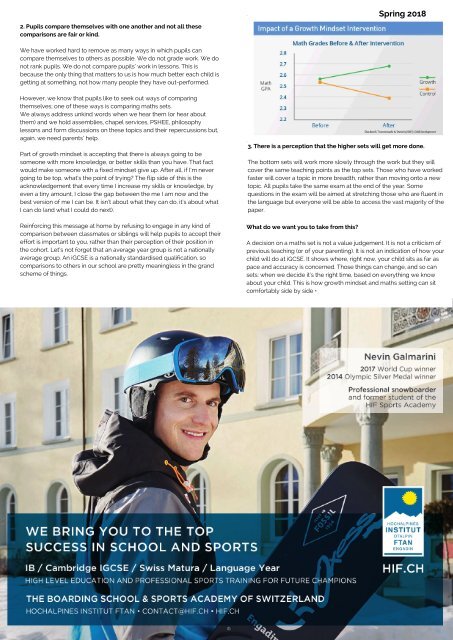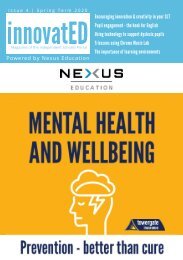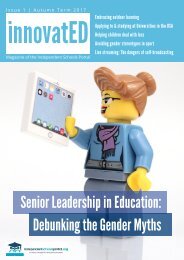innovatED - Issue 2
You also want an ePaper? Increase the reach of your titles
YUMPU automatically turns print PDFs into web optimized ePapers that Google loves.
Spring 2018<br />
2. Pupils compare themselves with one another and not all these<br />
comparisons are fair or kind.<br />
We have worked hard to remove as many ways in which pupils can<br />
compare themselves to others as possible. We do not grade work. We do<br />
not rank pupils. We do not compare pupils’ work in lessons. This is<br />
because the only thing that matters to us is how much better each child is<br />
getting at something, not how many people they have out-performed.<br />
However, we know that pupils like to seek out ways of comparing<br />
themselves; one of these ways is comparing maths sets.<br />
We always address unkind words when we hear them (or hear about<br />
them) and we hold assemblies, chapel services, PSHEE, philosophy<br />
lessons and form discussions on these topics and their repercussions but,<br />
again, we need parents’ help.<br />
Part of growth mindset is accepting that there is always going to be<br />
someone with more knowledge, or better skills than you have. That fact<br />
would make someone with a fixed mindset give up. After all, if I’m never<br />
going to be top, what’s the point of trying? The flip side of this is the<br />
acknowledgement that every time I increase my skills or knowledge, by<br />
even a tiny amount, I close the gap between the me I am now and the<br />
best version of me I can be. It isn’t about what they can do, it’s about what<br />
I can do (and what I could do next).<br />
Reinforcing this message at home by refusing to engage in any kind of<br />
comparison between classmates or siblings will help pupils to accept their<br />
effort is important to you, rather than their perception of their position in<br />
the cohort. Let’s not forget that an average year group is not a nationally<br />
average group. An iGCSE is a nationally standardised qualification, so<br />
comparisons to others in our school are pretty meaningless in the grand<br />
scheme of things.<br />
3. There is a perception that the higher sets will get more done.<br />
The bottom sets will work more slowly through the work but they will<br />
cover the same teaching points as the top sets. Those who have worked<br />
faster will cover a topic in more breadth, rather than moving onto a new<br />
topic. All pupils take the same exam at the end of the year. Some<br />
questions in the exam will be aimed at stretching those who are fluent in<br />
the language but everyone will be able to access the vast majority of the<br />
paper.<br />
What do we want you to take from this?<br />
A decision on a maths set is not a value judgement. It is not a criticism of<br />
previous teaching (or of your parenting). It is not an indication of how your<br />
child will do at iGCSE. It shows where, right now, your child sits as far as<br />
pace and accuracy is concerned. Those things can change, and so can<br />
sets: when we decide it’s the right time, based on everything we know<br />
about your child. This is how growth mindset and maths setting can sit<br />
comfortably side by side •<br />
Helpful tips when supporting parents






